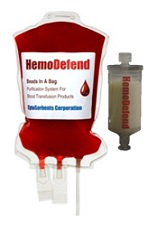 HemoDefend™ is a family of products under development at CytoSorbents designed to improve the safety and quality of blood transfusion products.
HemoDefend™ is a family of products under development at CytoSorbents designed to improve the safety and quality of blood transfusion products.
HemoDefend-RBC: HemoDefend-RBC is a blood filter designed to remove non-infectious contaminants from packed red blood cells, such as cytokines, free hemoglobin, potassium, bioactive lipids, antibodies, and others that can potentially lead to transfusion reactions. Each year, there are an estimated 85 million transfusions of packed red blood cells worldwide, each with an up to 3% risk of a transfusion reaction. These reactions can be as mild as fever or itching, to potentially life-threatening transfusion related acute lung injury (TRALI) and anaphylaxis. Many of these reactions are thought to be caused by non-infectious materials from either the blood donor, or from de novo generation during blood storage.
HemoDefend-RBC™ is a single-pass, in-line filter between the blood bag and the patient, capable of removing many non-infectious contaminants from packed red blood cells (pRBCs) when used at the time of transfusion. The filter, currently under advanced development, is gravity-fed and requires no machines and no electricity or other energy source to work. The goal is to reduce the risk of transfusion reactions, which is especially important in critically-ill patients, trauma patients, cancer patients, and high risk surgery patients that receive many units of blood where the risk a reaction is cumulative. Development of HemoDefend-RBC is supported through funding from the National Heart, Lung and Blood Institute (NHLBI), a division of the National Institutes of Health (NIH), andU.S. Special Operations Command (USSOCOM) in the past.
CTSO HemoDefend Poster – June 2017
HemoDefend-BGA™: HemoDefend-BGA is a second product in the HemoDefend family that is designed to create “universal plasma” by removing anti-A and anti-B antibodies that make plasma blood-type specific. Plasma is a core whole blood component that contains many essential proteins such as albumin and coagulation factors. It is often used to expand blood volume and restore the ability of blood to clot in many serious illnesses such as trauma and massive hemorrhage, shock, liver disease, severe burn injury, sepsis, and other conditions. It is also used in plasma exchange procedures to treat autoimmune diseases. More than 10,000 units of fresh frozen plasma are administered each day, or more than 3.6 million units per year, in the United States alone. With the exception of Type AB plasma, plasma typically requires blood-type matching with the patient to prevent incompatibilities and reduce the risk of major transfusion reactions. Because Type AB plasma lacks blood type-specific antibodies, it is called ‘universal plasma’ and can be readily administered to patients in emergency situations, making logistics fairly straightforward for both military and civilian applications. However, there are not enough Type AB plasma donors to supply current demand.
With funding from the U.S. Department of Defense, CytoSorbents has successfully developed and demonstrated a prototype HemoDefend-BGA adsorber that removes anti-A and anti-B antibodies from human plasma, with the goal of enabling an off-the-shelf, one-size-fits-all blood-type independent “universal plasma” to help save lives. In 2020, CytoSorbents received additional DOD funding to advance HemoDefend-BGA through pre-clinical development to human clinical trials.



